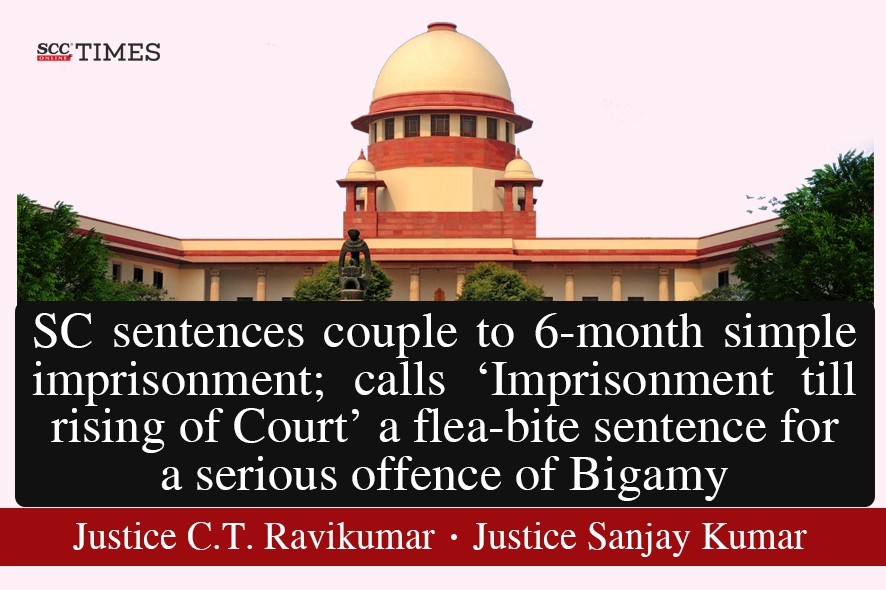Supreme Court: In a criminal appeal filed by the husband against the judgment passed by the Madras High Court, to the extent it imposed only a flea bite sentence for the conviction of the accused wife for the offence under Section 494 of the Penal Code, 1860 (‘IPC’) (Section 223 BNSS). and confirmed the acquittal of the parents of the wife, the division bench of C.T. Ravikumar* and Sanjay Kumar, JJ. has held that imposition of sentence of ‘imprisonment till the rising of the court’ upon conviction for an offence under Section 494 IPC, on them was unconscionably lenient or a flea-bite sentence. Thus, the Court modified the sentence to six months each, making the nature of the sentence as simple imprisonment for the said period. The Court also modified the fine from Rs. 20,000/- each to Rs. 2,000/- each, as originally awarded by the Trial Court.
Background:
The appellant herein is the husband of the accused wife, and he had filed a private complaint under Section 200 of the Code of Criminal Procedure, 1973, (‘CrPC’) (Section 223 BNSS) against his wife and her second husband for having committed Bigamy. In fact, on the ground of abetting them for committing the said offence the parents of the wife were also arraigned as accused.
In this case, the wife, pending the proceedings for dissolution of marriage and during subsistence of nuptial bond, married another man and that in the wedlock a child was born. Therefore, the husband accused them of committing bigamous marriage. The Trial Court acquitted the parents and convicted the wife and her second husband, under Section 494 IPC, and sentenced them to undergo one-year rigorous imprisonment each and imposed a fine of Rs. 2,000/- each.
Thereafter, the Additional District and Sessions Judge acquitted the wife and her husband. Aggrieved, the husband filed an appeal before the High Court, wherein the High Court imposed a sentence of ‘imprisonment till the rising of the court’ upon conviction. Aggrieved, the husband filed the present appeal.
Issue: Whether the High Court had shown undeserving leniency and sympathy to the wife and her second husband even after finding that they have committed the serious offence of bigamy punishable under Section 494 IPC, and whether they were let off with a flea-bite sentence and whether an enhancement of sentence is invited?
Analysis and Decision:
The Court took note of State of Punjab v. Bawa Singh, (2015) 3 SCC 441 , wherein it was held that it is the duty of every court to award proper sentence considering the offence and the way it was executed or committed. The court must not only keep in view the rights of the victim but also society at large while considering the imposition of appropriate punishment. Meagre sentences imposed solely on account of lapse of time without considering the degree of the offence will be counterproductive in the long run and against the interest of society.
Thus, the Court said that the deserved punishment proportionate to the gravity of the offence is a continuous and continuing demand based on civic sense and unfailing in categories of serious offences where more than individual interest is also involved, the above rule of proportionality in providing punishment should not failed as otherwise it will impact the society.
However, the Court added that it should not be understood to have held that imposition of sentence on such offenders shall be to satisfy the society. The point is to follow the rule of proportionality in imposing punishment to promote and bring order and orderliness in society.
The Court noted that the case on hand unfolds as grievance of grave deviation of the principle of sentencing laid down by this Court and it carries a consequential prayer for enhancement of punishment for conviction for the offence under Section 494 IPC.
After reading Sections 494 and 495 (Section 82(2) of BNS) IPC, the Court noted that the legislature viewed the offence of bigamy as a serious offence. Though no minimum sentence is prescribed under Section 494 IPC, the maximum sentence of imprisonment prescribed thereunder for a conviction thereunder is seven years of imprisonment of either description. The Court further noted that the said offence is compoundable only by the husband or wife of the person so marrying with the permission of the Court. The same offence under Section 494 IPC, with concealment of former marriage from person with whom subsequent marriage is contracted would visit the offender with imprisonment of either description for a term which may extend to ten years and with fine. This offence, which is an aggravated form of bigamy, is non compoundable.
Thus, once it is found that an offence under Section 494 IPC, is a serious offence, the Court held that the imposition of ‘imprisonment till the rising of the Court’ is not a proper sentence falling in tune with the rule of proportionality in providing punishment as mentioned hereinbefore. The Court also said that it is a fact that earlier certain High Courts maintained a view that sentencing an accused to undergo ‘imprisonment till the rising of the court’ would be no sentence at all, according to law.
The Court took note of Muthu Nadar, In re, 1945 SCC OnLine Mad 29, wherein it was held that penal provision provides any fixed term as the minimum, the court has full discretion to pass a sentence of imprisonment for any period if it would be fit.
The Court said that the proviso to Section 418(1) CrPC (Section 458 BNSS), together with the penal provision under Section 494 IPC, prescribing no minimum imprisonment, but only the maximum, would make imposition of ‘imprisonment till the rising of the court’ intra vires.
The Court said that in the matter of awarding sentence for conviction of an offence which may impact society, it is not advisable to let off an accused after conviction with a flea-bite sentence.
The Court said that there cannot be any doubt with respect to the position that in imposing sentence the Court is to take into consideration the nature of the offence, circumstances under which it was committed, degree of deliberation shown by the offender, antecedents of the offender upto the time of sentence, etc., and, in the absence of any exceptional circumstances, impose sentence in tune with the rule of proportionality in providing punishment though it falls within the realm of judicial discretion.
Thus, the Court held that imposition of sentence of ‘imprisonment till the rising of the court’ upon conviction for an offence under Section 494 IPC, on them was unconscionably lenient or a flea-bite sentence.
The Court while noting that the wife married the second husband while the marriage with the first husband was subsisting and not only that, during its subsistence, she had also begotten a child through the second husband, said that undeserving leniency was shown in the case on hand.
However, considering the fact that the child born to the accused persons was aged less than two years when the Trial Court passed the sentence and that no minimum term of imprisonment is prescribed for the conviction under Section 494 IPC, and that the maximum sentence imposable for conviction thereunder is seven years, the Court viewed that Trial Court had virtually struck a balance in fixing the term of one year as the corporeal sentence.
But then, taking note of the fact that the said child is now aged only about six years and the sentence for the conviction under Section 494 IPC, can be of both descriptions, the Court modified the sentence to six months each, making the nature of the sentence as simple imprisonment for the said period. The Court also modified the fine from Rs. 20,000/- each to Rs. 2,000/- each, as originally awarded by the Trial Court.
Noting that the child is now aged only about 6 years, the Court directed the husband to surrender first, within 3 weeks from this order’s date, to serve out the rest of the sentence. The wife was directed to surrender within 2 weeks after the release of the second husband from the jail.
CASE DETAILS
|
Citation: Appellants : Respondents : |
Advocates who appeared in this case For Petitioner(s): For Respondent(s): |
CORAM :







